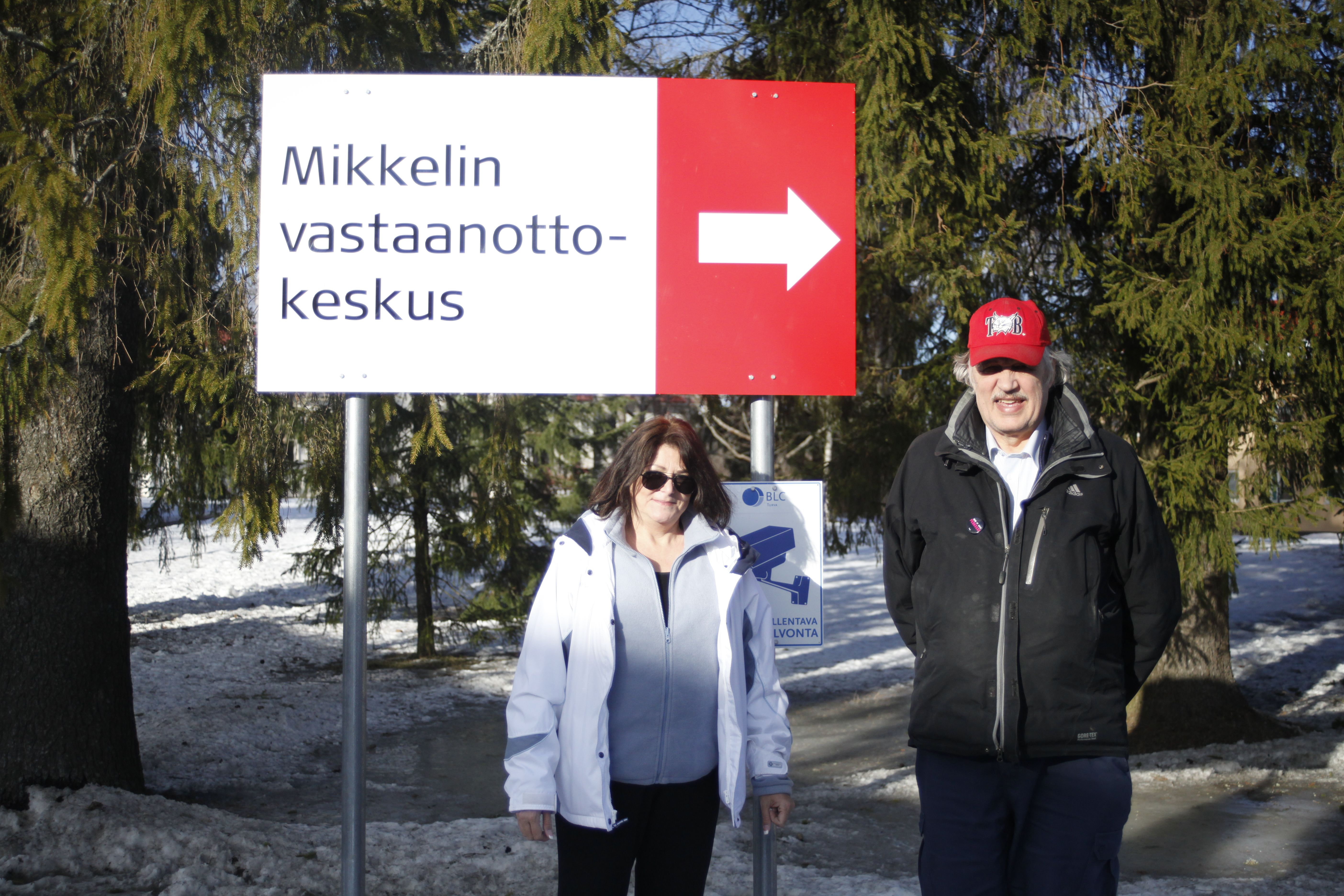Ahti Tolvanen
There was a historic encounter in Finland last week when the first ever visitor of North America’s Ojibwe Nation, Sandi Boucher, came to meetings in Helsinki during UN Anti-Racism Week.
Ms. Boucher presented a new modern approach to constructive cross-cultural relations developed by Canada’s aboriginal community and scholars at Atlanta University, called the Alexis Principles. Key figures in developing the much-lauded method are Chief Alexis , a Sioux leader in Alberta, Canada and Leah Taylor, professor of cultural anthropology in Atlanta, USA.
Sandi Boucher and Ahti Tolvanen visited the Suonsaari asylum reception center on March 20. Photo by Enrique Tessieri.
The Alexis method has been tried and proven effective in Canada, the USA and Australia, and last year drew considerable favorable attention in Hawaii at the World Conference on Aboriginal Education.
At a symposium in Helsinki’s Caisa Cultural Center March 23rd representatives of all the political parties were invited to meet Ms. Boucher and tell how they would address racism issues during the UN’s Anti-Racism Week. Only Green Party deputy city councillor Kati Juva , Social Democratic MP Erkki Tuomioja and Coalition Party membership holder Oge Eneh showed up. The evening’s theme was “silence on racism is not enough”. The Leftist Union, The Center Party, The Swedish People’s Party and the Christian Party presumably preferred to remain silent on racism as their representatives shunned the event.
Information on the Alexis method was offered in Finland by Ms. Boucher to third world development workers, immigration service workers, educators and interested members of the public at venues in Helsinki as well asTurku University and Mikkeli University of Applied Sciences. Conspicuous by their absence were also representatives of the Finnish Immigration Service (Migri) which had just hired hundreds of new untrained staff to deal with a backlog of asylum applications.
Like Finland, Canada has in recent months seen a large influx of refugees fleeing conflicts in the Middle East.
During her visit, here are some questions Ms. Boucher answered:
What is the response in your Ojibwe community to the admission of refugees from the Middle East?
Some people in my community first asked: ”Why is the government helping these refugees when we have all these unmet needs like communities without clean water”. My response is that we may have needs, but we are not being bombed and fleeing from destroyed homes. Denying help to people in distress is not who we are. Our culture teaches us we need to help everyone in dire need. We need to do both forms of helping.
I think it is human nature to fear those that are different, just as it is human nature for some to try to build themselves up by tearing others down.
Aren’t you being a bit insensitive to those in your community living in poor conditions?
I say this although I know where some of these people in my community are coming from. I know what it is like to have to sell my furniture to provide for my children. I know what it is to go without eating so my children can have food.
What personal experience do you have of discrimination?
I was disowned by my ex-mother-in-law. My first husband was non-aboriginal. I have been called every kind of racial slur. I have been treated rudely by sales staff upon learning I am Ojibwe. I have had people imply I must be an alcoholic or assume I was living in poverty, and the list goes on and on. Discrimination is almost always subtle, but it is felt deeply by those affected.
We have young men, some with criminal records, forming patrols to provide protection from immigrants.Do you think they are trying to take attention away from themselves by making the foreigners seem to be the threat?
People who take a racist attitude often have low self-esteem themselves.
My ex’s brother married a Finnish woman, and she said she was happy to have me in the family. She said although Finns like her were known for drinking I was obviously the sort who drank more. She joked that I would make her look good in my mother-in-law´s eyes. I think it is human nature to fear those that are different, just as it is human nature for some to try to build themselves up by tearing others down. But I don’t believe we are a slave to our nature. What seems natural to us is often not right.
I stand for conscious living. Choosing our action and words consciously over automatic and often inappropriate actions and responses. That is also taught in the Alexis principles.
Do people from other places have a right to bring their problems to where we live?
Some people say refugees should not come to our country and bring all their problems, they should stay home. I reply that this is what people say about us aboriginals. That we should just stay in the backwoods out of sight. And then I point out that every place in Canada was our original home.
Communications and travel have brought the world together and made us very much a community. No one people can really isolate themselves from the rest. Refuse to share the troubles of others. We are all so much dependent on each other.
During her visit Sandi Boucher was hosted by two Finnish universities as well as Finnish Foreign Scholars Forum r.y. and Safra r.y. The former organization also endorsed a report on the status of Africans in Finland prepared by board member Enrique Tessieri.

